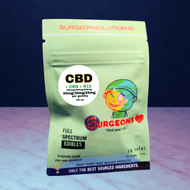Surgeons Online Cannabinoid Academy
How CBD Affects Liver Enzymes and Drug Metabolism
Introduction
CBD, or cannabidiol, is celebrated for its therapeutic potential in managing stress, pain, and sleep disorders. However, as CBD interacts with the body’s natural systems, it also affects liver enzymes responsible for processing medications. Understanding how CBD influences drug metabolism is crucial for individuals taking prescription drugs or managing complex health conditions. This guide explores CBD’s impact on liver enzymes and provides tips for safe and effective use.
What Are Liver Enzymes and Their Role in Drug Metabolism?
Liver enzymes, particularly the CYP450 enzyme system, play a critical role in metabolizing medications and other substances in the body. These enzymes break down drugs into forms that the body can use or eliminate. The liver’s ability to process substances efficiently ensures medications achieve their intended effects without accumulating to toxic levels.
For example, CYP450 enzymes metabolize many common medications, including blood thinners, antidepressants, and antiepileptic drugs. Cannabinoids like CBD are also processed through this system, which is why understanding their interaction with liver enzymes is essential for safe use.
How CBD Interacts with Liver Enzymes
CBD has been shown to inhibit the activity of CYP450 enzymes, slowing the metabolism of certain medications. By binding to these enzymes, CBD temporarily reduces their ability to break down drugs, potentially altering their effectiveness and duration in the body.
This interaction is dose-dependent, meaning higher doses of CBD are more likely to impact enzyme activity. For individuals taking medications with a narrow therapeutic index—such as warfarin or certain anticonvulsants—this can lead to significant changes in drug levels, increasing the risk of side effects or reduced efficacy.
Implications of Altered Drug Metabolism
CBD’s effect on liver enzymes can have various implications for medication management:
- Increased Drug Levels: Slower metabolism may cause medications to accumulate in the bloodstream, heightening the risk of side effects.
- Reduced Drug Effectiveness: In some cases, CBD’s interaction with liver enzymes may lead to reduced drug activity, making medications less effective.
- Variable Responses: Individual factors such as genetics, dosage, and other health conditions influence how CBD affects drug metabolism.
Medications commonly affected by CBD interactions include:
- Blood thinners (e.g., warfarin)
- Antiepileptic drugs (e.g., clobazam)
- Antidepressants (e.g., SSRIs)
- Immunosuppressants (e.g., tacrolimus)
How to Use CBD Safely While Taking Medications
To safely use CBD alongside medications, consider the following tips:
- Consult a Healthcare Provider: Always discuss CBD use with your doctor, especially if you’re taking prescription medications.
- Start with a Low Dose: Begin with a small amount of CBD and gradually increase as needed, monitoring for any changes in medication effectiveness or side effects.
- Time Your Doses Carefully: Taking CBD and medications at different times of the day may reduce the likelihood of interactions.
- Choose High-Quality Products: Opt for third party-tested CBD products with clear labeling to ensure purity and potency.
By following these guidelines, individuals can minimize risks and safely incorporate CBD into their wellness routines.
Conclusion
CBD’s ability to influence liver enzymes and drug metabolism highlights the importance of informed and cautious use. While CBD offers numerous wellness benefits, understanding its interaction with medications ensures safe and effective integration into your health routine. Consult with healthcare professionals, monitor your response, and prioritize high-quality products to maximize the benefits of CBD while minimizing risks.
Introduction
- Overview of CBD’s interaction with the body and its potential to affect liver enzymes.
- Importance of understanding how CBD influences drug metabolism.
What Are Liver Enzymes and Their Role in Drug Metabolism?
- Explanation of liver enzymes like CYP450 and their role in breaking down medications.
- How the liver processes substances, including cannabinoids like CBD.
How CBD Interacts with Liver Enzymes
- Discussion of CBD’s inhibition of the CYP450 enzyme system.
- Explanation of how this interaction can alter drug metabolism.
Implications of Altered Drug Metabolism
- Potential effects on medication effectiveness and safety.
- Examples of medications commonly affected by CBD interactions.
How to Use CBD Safely While Taking Medications
- Tips for managing CBD use alongside prescription drugs.
- Importance of consulting a healthcare provider for personalized guidance.
Conclusion
- Recap of CBD’s effects on liver enzymes and drug metabolism.
- Encourage readers to prioritize safety and informed decision-making.







